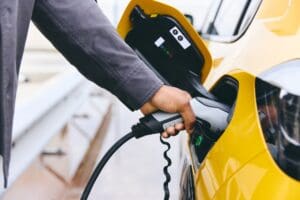
The shift to electric cars has continued with combined battery-electric, plug-in hybrid and hybrid electric vehicle production in January rising by almost 50 per cent compared with a year ago.
The latest figures from the Society of Motor Manufacturers and Traders show that the total number of electric or hybrid vehicles produced was 28,329, representing more than four in every ten cars made in January, a near-record monthly share.
The trade body said total car production was “stable” last month, with output down by 0.3 per cent to 68,575, equivalent to 215 fewer cars. Supply chain shortages were still afflicting some manufacturers, it reported.
Production for the UK increased by 5.6 per cent while exports fell by 1.5 per cent, largely due to the suspension of shipments to Russia.
More than four out of five cars built last month were destined for overseas markets, with more than half of these for the European Union.
Mike Hawes, chief executive of the SMMT, said: “Automotive manufacturing can drive long-term growth for the low-carbon economy but the sector needs competitive conditions to attract investment.
“Recent global developments, however, suggest increasing protectionism that, if not challenged or mitigated, could put the UK at a disadvantage.
“To deliver a wholesale industrial transformation we need a competitive framework and a pitch that promotes advanced vehicle manufacturing internationally.
“We now look to the forthcoming budget for the necessary measures that will enable the automotive sector to deliver its undoubted potential.”
The latest independent outlook anticipates production increasing by 9 per cent to 842,200 cars this year, driven by growth in electrified vehicles, the society said.
By 2025 car and light van production is predicted to be more than one million, it added.
Richard Peberdy, of KPMG, said: “An easing of supply shortages and continued demand for new cars, despite the cost of living squeeze, is keeping the market moving, but medium to longer-term questions remain unanswered.
“At present the UK is proving a less attractive proposition for new vehicle manufacturing facilities due to relatively high labour and energy costs, and access to raw materials and chemicals.”

